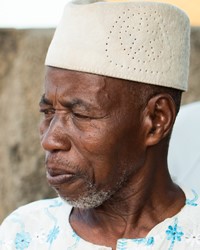The Ligbi (AKA, Banda) are a subgroup of the larger Mande people. The Ligbi people speak the Ligbi language. The Ligbi live in northwestern Ghana and northeastern Cote d'Ivoire. Specifically they live in Numasa, northwest Brong-Ahafo; east of Sampa and northwest of Wenchi. In Cote d'Ivoire they live in the Eastern Department, Bineto village; Bouna community; Slil town near Boundoukou; Ourodougou near Malinke [loi] territory.
The main source of income for the Ligbi Banda in Cote d'Ivoire comes from farming. Sorghum and manioc (a shrubby plant with a thick, starchy root) are their main crops. They also grow potatoes, peanuts, bananas, corn, peas, rice, and melons. The Ligbi do not raise many cattle because of the tsetse flies. However, they do keep goats, dogs, chickens, and some sheep. Hunting is also important because the meat provides most of the protein in their diet. Very little fishing is done because of the dangerous insects swarming around the rivers. The men generally clear the land, while the women do most of the planting and harvesting. The older men hunt and the younger men perform the required "bride service." This entails tending to their in-laws' farms. Polygyny (having multiple wives) is common among the Ligbi. Wives live in their own private huts, to which the husband rotates. There is a "chief wife" who has authority over all the others. A Ligbi village is arranged in a circle around a central court. Each neighborhood has from three to ten huts. A typical house is round with low walls of beaten dirt and a thatch roof that is supported by a central post. Each community has a headman, or a clan chief who lives in the central court of the village. He handles the affairs of the people by acting as judge. The Ligbi people have many enemies in the world of nature; their homeland is awash with mosquitoes, tsetse flies, and blackflies that carry diseases like malaria, yellow fever, sleeping sickness, and river blindness. They also live in an area where there is wild game to hunt. Though they are mainly a farming people, but the Ligbi are noted for their artwork which is desired by people in other parts of the world.
They belong to any of five Muslim sects. This Ligbi people in Cote d'Ivoire are officially Muslim though they believe that the spirit world can harm them in many ways. The non-Muslim Ligbi practice ethnic religions such as ancestor worship (praying to deceased ancestors for help or guidance). When a person dies, the family sets up a special shrine in his honor. Every important step in a man's life is recorded at his shrine. The ancestral spirits are worshipped at the shrines, usually by the men. They believe these to be "guardian spirits" over the family's children. The Ligbi also believe in bush spirits or fairies. They believe the fairies are small creatures with large heads covered with rough hair. They are rarely seen and act as humans would act. The fairies are said to take revenge on people who offend them, by either making them insane or killing them. The Ligbi wear magical charms and make medicines to protect themselves from curses or diseases. When a woman has twins, they view this as a punishment or a curse on the family. Parents of twins must be purified. The Ligbi believe that anyone who defies the magical charm or purifying medicine will be cursed.
The Ligbi people in Cote d'Ivoire need help in eliminating dangerous pests in their area that cause debilitating diseases. Believers with the right skills can go to their homeland and help them with these problems that lead to serious health issues. They also need to put their faith in Jesus Christ, who is the only firm foundation.
Pray for the Lord to bless the Ligbi people in Cote d'Ivoire with an abundant harvest as a demonstration of his power and goodness. Pray for the Lord to thrust out workers to the Ligbi people. Pray for the Ligbi people to have a desire for truth and righteousness only found in Christ. Pray for a Disciple Making Movement among the Ligbi people in Cote d'Ivoire.
Scripture Prayers for the Ligbi in Côte d'Ivoire.
| Profile Source: Joshua Project |











